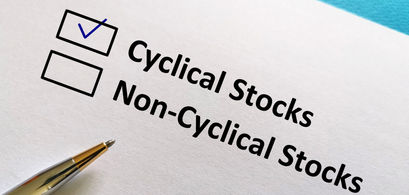There is no doubt the stock market presents individuals with a variety of investment opportunities every trading day. One of the opportunities investor should be familiar with is cyclical stocks. As consumers, we are at the mercy of large economic swings or cycles. As investors, we realize these same economic cycles provide us with a chance to grow our investment returns or protect ourselves; if we know what signals to look for.
Cyclical Stock Theory
The concept behind cyclical stock theory goes something like this: The financial health of some companies move in sync with the health of the economy, while other companies are relatively unaffected by economic downturns or surges. By understanding this cyclical relationship, investors can maximize the total return on their portfolio of stocks.
Identifying Cyclical Stocks
We're going to discuss how investors can capitalize on this theory later in this article. But first we're going to split the entire universe of stocks into two broad categories:
Cyclical Stocks, and
Noncyclical Stocks
Cyclical Stocks
When a company's financial well-being moves in sync with economic cycles, the company is said to be a cyclical stock. They thrive during upswings, and suffer during downswings; oftentimes significantly. These companies generally manufacture goods, or provide services, that are considered luxury items or non-essential in nature. These companies thrive during economic upswings because consumers have more discretionary income, or money, to spend. They buy more cars, eat at upscale restaurants, take exotic vacations, and buy more expensive clothing. When times are good, these companies thrive because the demand for their products and services surges. Cyclical stock industries are often associated with companies that produce durable goods. These are items that are made to last a long time such as refrigerators, cars, and air conditioners. During downturns in the economy, consumers may decide to have these goods repaired instead of replaced. For example, they'll hold off on buying a new car for a couple of years until the economy turns around.
Additional Resources
In the service sector, the travel industry is considered a good example of a cyclical service; especially when it comes to flying to exotic getaway destinations. Once again, this type of service would suffer during economic downturns, and thrive when the cycle reverses itself and times are good.
Noncyclical Stocks
When a company's financial well-being does not move in sync with economic cycles, the company is said to be a noncyclical stock. These companies produce goods or services that consumers are going to buy because they are necessities, or non-discretionary expenses. Noncyclical stocks are not affected during economic downturns or upswings. During a recession, consumers still need to buy their goods or services. Conversely, when economic times are booming, consumers are not going to buy more goods or services just because they have more money to spend. The classic example of a noncyclical stock includes utilities: natural gas, heating fuel oil, electricity, and water. A second class of noncyclical stocks includes companies producing what are called "non-durable goods." The classic examples include household goods such as soap, detergent, toothpaste, and most food items. These are essential household items that most consumers will purchase even when money is tight.
Investing in Cyclical and Noncyclical Stocks
Now that we understand how to identify cyclical and noncyclical stocks, how can we use this information to maximize the return on our investment portfolio?
When to Buy Cyclical Stocks
If we know that cyclical stocks thrive when economic times are good, then the best time to invest in these companies is during economic upturns. For example, the ideal time to purchase stocks that are affected by economic cycles is right after the economy seems to be coming out of a recession. That's because consumers may have been holding off buying a new car for a couple of years, and they sense good times are on the horizon. For that reason, car manufacturers will often see a surge in demand for their vehicles right after a recession. It's also worth mentioning that some investment advisors, such as Peter Lynch, recommend avoiding cyclical stocks altogether. The rationale is that returns from cyclical stocks are not reliable enough to hold in your portfolio.
When to Buy Noncyclical Stocks
It's always a good time to buy noncyclical stocks. If we find this type of stock, and its outlook is promising, then it's going to keep on growing, regardless of the economy. The best time to buy noncyclical stocks is just before the economy enters a downturn. That's the reason investors sometimes refer to noncyclical stocks as defensive stocks. They can provide investors with a safety net during turbulent times. During economic downturns, utilities are particularly attractive to investors because of franchise territory protections, the essential nature of their products, and the fact they are usually high dividend paying stocks. These factors make these companies very safe investments.
Cycles of the Economy
When it comes to predicting the next cycle of the economy, that research is going to have to be done elsewhere. Once in a cycle, it's easy to figure out if the economy is expanding or contracting. The point of this article is that individuals, armed with the knowledge of when to buy cyclical stocks, or when to avoid them, can make an informed investment decision. Investors can choose to use economic cycles to their advantage when selecting stocks. That's just one form of "timing the market," which carries with it the risk of mistiming a cycle.
Cyclical stock theory: The financial health of these companies move in sync with the economy, while others are relatively unaffected by economic downturns or surgesMoneyzine Editor








